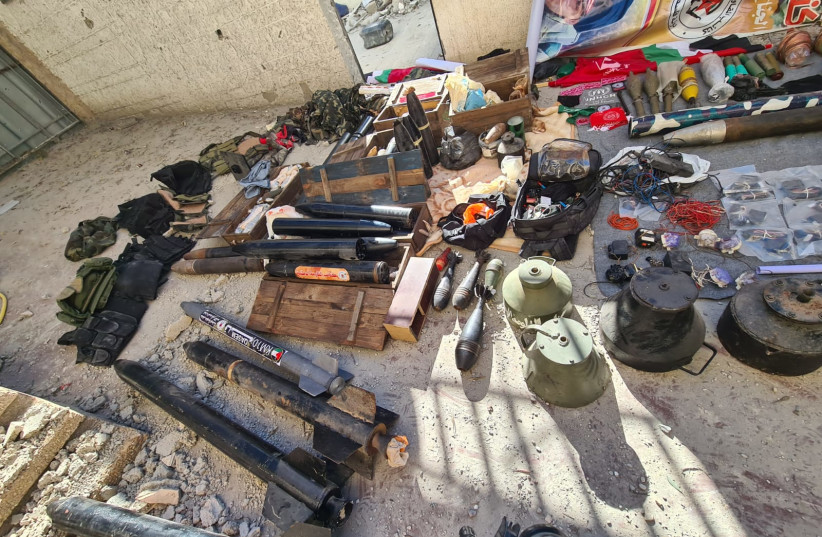The Philadelphi Corridor matters because Gaza deal may never get to phase two
It is highly unlikely that the three-part Gaza hostage deal that is on the table would survive beyond Phase One – that is the reason that the spotlight is suddenly on the Philadelphi Corridor, the buffer zone between Egypt and Gaza.
That deal unveiled on May 31 is based on a creative fiction that allows for both sides to get some of their immediate goals, without dealing with the fact that Phases Two and Three of the deal might be unattainable.
It effectively kicks the unresolvable issues down the road to allow for the release of up to 32 of the remaining 101 hostages during a six-week period.
Effectively, the May 31 agreement creates a second temporary deal, one that follows the one in November which saw the release of 105 hostages.
The hope had been that hostages could be freed while negotiations continue on intractable issues, such as a permanent ceasefire and a complete IDF withdrawal from the enclave.

The United States has hoped to pull a rabbit out of a hat in those six weeks in November by finding a way to turn the temporary ceasefire into a permanent one, while still removing Hamas from Gaza. Washington has held fast to the view that diplomacy is the only way to remove the terrorist group from power, but has not outlined how it would do so.
US National Security Communications Adviser John Kirby on Wednesday said that “what we’re focused on right now is a Phase One, that is a six-week ceasefire.
“If you can get through Phase One… that is the goal, just let us get to Phase One right now, then you can start building toward Phase Two and if you can get both sides to Phase Two, then you are talking about a real potential end to the hostilities.”
To imagine that Israel and Hamas move to Phase Two is to imagine that Hamas agrees to leave Gaza or that Israel agrees to end the war while Hamas is still active.
It’s the equivalent of asking either Hamas or Israel to take steps that they consider to be suicidal, and neither are the suicidal type.
The issue of Philadelphi had not been part of the debate when the May 31 framework agreement was drawn up – because the IDF had only recently seized the Corridor which it had withdrawn from in 2005.
It agreed that the IDF would withdraw from populated areas in Gaza during Phase One, and could return to there if the deal fell apart between Phases One and Two.
The Philadelphi Corridor had initially not been considered to be part of that withdrawal because much of it is in isolated areas, so Israel might have imagined that the IDF could remain there for Phase One.
In sorting out the details of the how to carry out the plan, it became clear that the expectation was for Israel to leave Philadelphi, with Hamas insisting that this was the only way to make a deal.
In effect, what it did was place intractable issues, ones that are within the framework of a temporary deal with no clear way out, except for either of the two sides to cave.
Hamas lifeline
For Hamas, which smuggled weapons through tunnels under the Philadelphi Corridor for years, it’s an existential demand, with the group’s survival literally depending on it.
It fears that if Israel stays during Phase One, and then the deal falls apart, the IDF’s presence will become a permanent reality, chocking it off.
Israel, for its part, also views the IDF presence as existential, because that would prevent such smuggling and keep Hamas from posing a significant threat to Israel in the future.
Security officials fear that Israel would lose the chance to return at least some of the hostages if it doesn’t cave in on Philadelphi. They have argued that little will be lost if Israel is away from the Corridor for the six weeks to takes to execute Phase One of the deal.
So Israel, they have stressed, can afford to show flexibility to save the lives of the hostages by temporarily withdrawing.
But, for Prime Minister Benjamin Netanyahu, the issue is not whether Israel can safely withdraw for six weeks, but whether it would ever be able to return.
Netanyahu said as much in a press conference on Wednesday night: “We’re in now, [if] we leave we won’t [be able to] come back. You know it. Everybody here knows it.”
The debate over Philadelphi has come to symbolize the larger divide on the questions around hostage deals that often pit the issue of saving lives in the present at the expense of endangering others in the future.
But this specific debate has also exposed the flaws in a deal that is so fraught with discord, that at best, after three months, the only subject on the table is a six-week truce, with no clear road-map to the next Phase.





Comments are closed.